May 24, 2017 | Non categorizzato
On Saturday, May 20, the elementary school of Largo Baccelli located in Pesaro (Italy) was dedicated to Chiara Lubich, founder of the Focolare Movement. The Mayor, the Councillor for Development and the Councillor for Dialogue spoke at the ceremony. The latter stated that “streets, public squares and kindergartens have been named after Chiara Lubich, but this is the first time in Italy that an elementary school has been dedicated to her, who had been a primary school teacher. ” Children and their families participated in the event, as well as Giuseppe Milan, Professor of Pedagogy and Intercultural Studies at the University of Padua, who spoke about “Chiara Lubich and the educational relationship”.
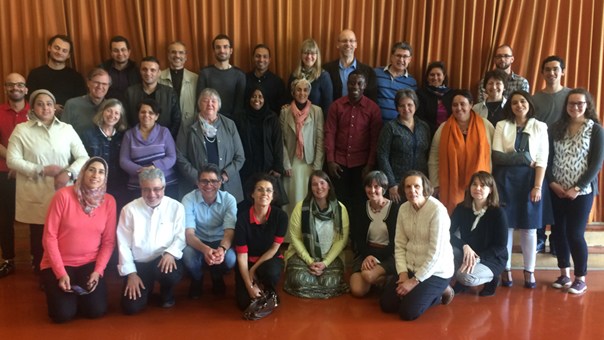
May 24, 2017 | Focolare Worldwide
 «What lies in our heart? Towards what is it oriented? How can we learn to know it better? Aren’t the paths of the heart like roller coasters?» These are some of the issues which stimulated the dialogue between Christians and Muslims participating in a meeting and were visible signs of the desire of both groups to share. The meeting was held at the Muslim cultural center at the end of April and ended in the evangelic parish. It started with the theological reflections of the evangelical pastor, Martin Hoegger, and the Imam, Djalel Meskaldji. Both considered how the Bible and the Koran amplify the meaning of the word “heart,” not only as the seat of sentiments, but rather as the center of our being, and that space where we find dialogue with our own selves, with the others and with God. «The most common disease is not the flu, but schlerosis, that is, the hardening of the heart», M. Hoegger ironically said. And Djalel Meskaldji added: «According to the Koran, the heart can be even harder than stones. It is covered with rust.» They underlined in fact, that the heart is the most precious thing we have, but experience tells us that often it can harden. This leads to the consideration that the “custody of the heart” is a frequent theme in the Bible and in the Fathers of the Church, theologians of the first centuries. And so, to keep a strong hold on one’s heart is a real “spiritual battle.” This would be, according to Meskaldji, the real meaning of the word “Jihad,” according to Muslim tradition. Pastor Hoegger recalled that the biblical prophets «announced that God will one day chisel his law of love in our hearts and put in us a new heart, a heart of flesh.» Furthermore: «Christians turn to Jesus in whom this promise was fulfilled.» On his part, the Imam stressed that: «the Koran repeatedly affirms that the heart needs to be purified by the limpid water of the word of God. It wakens my heart, nurtures it, breaks its toughness and cleans it of the rust that is mostly the outcome of pride.» From Algiers, in live streaming Sheherazad and Farouk, Muslims, recounted how the discovery of God who is love, through the spirituality of the Focolare Movement, has revolutionised their lives as a couple: «We have learned how to love the other for himself, and let God act in the heart of each one so as to be a living witness of the unity of God. But above all, we experience God’s grace which encloses our heart with his mercy.» Then, Anne Catherine Reymond and Fabien, Christians of the Sant’Egidio Community, shared their pathway, narrating how the presence of God has transformed their hearts through prayer and fraternal life, and also through their contact with the poor. «Faith in God is a compass in the challenges which a couple has to face, especially in the education of their children. They push us to place ourselves on a second plane so as to put God in the first place.» What came to light in the group dialogues was what Christians and Muslims have in common. A Muslim woman from Lyon concluded: «In an era in which many try to divide our communities, it is very important to gather together in an atmosphere of mutual esteem!» In this joyful day the participants unanimously expressed the desire to continue the dialogue, also through new encounters.
«What lies in our heart? Towards what is it oriented? How can we learn to know it better? Aren’t the paths of the heart like roller coasters?» These are some of the issues which stimulated the dialogue between Christians and Muslims participating in a meeting and were visible signs of the desire of both groups to share. The meeting was held at the Muslim cultural center at the end of April and ended in the evangelic parish. It started with the theological reflections of the evangelical pastor, Martin Hoegger, and the Imam, Djalel Meskaldji. Both considered how the Bible and the Koran amplify the meaning of the word “heart,” not only as the seat of sentiments, but rather as the center of our being, and that space where we find dialogue with our own selves, with the others and with God. «The most common disease is not the flu, but schlerosis, that is, the hardening of the heart», M. Hoegger ironically said. And Djalel Meskaldji added: «According to the Koran, the heart can be even harder than stones. It is covered with rust.» They underlined in fact, that the heart is the most precious thing we have, but experience tells us that often it can harden. This leads to the consideration that the “custody of the heart” is a frequent theme in the Bible and in the Fathers of the Church, theologians of the first centuries. And so, to keep a strong hold on one’s heart is a real “spiritual battle.” This would be, according to Meskaldji, the real meaning of the word “Jihad,” according to Muslim tradition. Pastor Hoegger recalled that the biblical prophets «announced that God will one day chisel his law of love in our hearts and put in us a new heart, a heart of flesh.» Furthermore: «Christians turn to Jesus in whom this promise was fulfilled.» On his part, the Imam stressed that: «the Koran repeatedly affirms that the heart needs to be purified by the limpid water of the word of God. It wakens my heart, nurtures it, breaks its toughness and cleans it of the rust that is mostly the outcome of pride.» From Algiers, in live streaming Sheherazad and Farouk, Muslims, recounted how the discovery of God who is love, through the spirituality of the Focolare Movement, has revolutionised their lives as a couple: «We have learned how to love the other for himself, and let God act in the heart of each one so as to be a living witness of the unity of God. But above all, we experience God’s grace which encloses our heart with his mercy.» Then, Anne Catherine Reymond and Fabien, Christians of the Sant’Egidio Community, shared their pathway, narrating how the presence of God has transformed their hearts through prayer and fraternal life, and also through their contact with the poor. «Faith in God is a compass in the challenges which a couple has to face, especially in the education of their children. They push us to place ourselves on a second plane so as to put God in the first place.» What came to light in the group dialogues was what Christians and Muslims have in common. A Muslim woman from Lyon concluded: «In an era in which many try to divide our communities, it is very important to gather together in an atmosphere of mutual esteem!» In this joyful day the participants unanimously expressed the desire to continue the dialogue, also through new encounters.
May 23, 2017 | Non categorizzato
https://vimeo.com/214575260
May 21, 2017 | Non categorizzato
May 21 is an important date for those who work for international, intercultural and interreligious dialogue and cooperation. On this day the whole world celebrates the World Day of Cultural Diversity for Dialogue and Development, established by the United Nations in 2002 following the adoption by UNESCO of the Universal Declaration on Cultural Diversity in 2001. The Day is an invitation to all – civil society, organizations, individuals, associations – to promote collaboration and encounter between peoples and cultures, with a view to enhancement, support and mutual respect
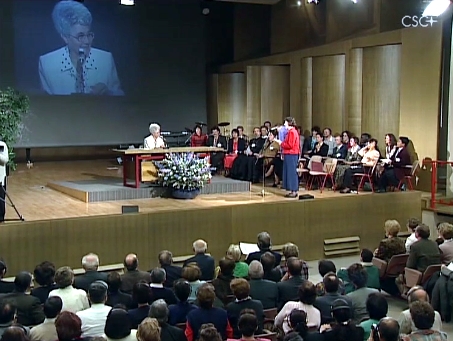
May 21, 2017 | Non categorizzato
In this 500th anniversary year of the Reformation, there has been new drive towards Christian unity, from the historic meeting at Lund in Sweden to the Pope’s recent journey to Egypt. The Focolare Movement is increasing its commitment to what is known as the “dialogue of life” or “dialogue of the people”. This was reaffirmed in the Ottmaring Declaration (21.02.2017) and its outworking happens daily in the efforts of thousands of Christians throughout the world. The 59th “Ecumenical Week” ended recently at Castel Gandolfo (9th-13th May) with 700 participants from 69 countries and many parts of the world. 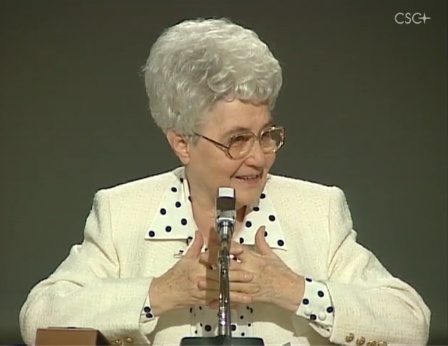 Chiara Lubich was asked about this kind of dialogue on the 4th April 1997 in the context of an ecumenical gathering and she replied spontaneously: “Veronica, an Anglican focolarina from Great Britain asks what our specific contribution to the unification of the Churches could be. Our contribution should be seen in the context of the whole field of ecumenism. We know that there is the dialogue of charity, which is very important. It probably goes back to the times of Athenagoras, when Pope Paul went to visit Athenagoras and Athenagoras went to see Pope Paul. The dialogue of charity helps us to feel that we are brothers and sisters and that we help one another. Then we pray together, which is a dialogue with God, a dialogue that goes through God. This too is very important especially during the Week of Prayer for Christian unity. In addition, you all know that there is the theological dialogue, carried out by experts; that too is going ahead despite the fact that some people say ecumenism is not going ahead. Instead, it is going ahead. We bring a new kind of dialogue. It is the dialogue of the people. It arose out of the spirituality [of unity] that we live in all the various Churches; there are members of 300 Churches who are in the Movement. This dialogue was generated by our spirituality because it is communitarian, it binds us to one another; it brings us together. If I love you and you love me, what is established between us? Jesus in the midst. But then Jesus unites us, as St Paul says, “What can separate us from the love of Christ?” (Rm. 8:35) Likewise, we say, “What will separate us?” Charity unites us. Christ himself unites us. No one can separate us if we go ahead with our spirituality.
Chiara Lubich was asked about this kind of dialogue on the 4th April 1997 in the context of an ecumenical gathering and she replied spontaneously: “Veronica, an Anglican focolarina from Great Britain asks what our specific contribution to the unification of the Churches could be. Our contribution should be seen in the context of the whole field of ecumenism. We know that there is the dialogue of charity, which is very important. It probably goes back to the times of Athenagoras, when Pope Paul went to visit Athenagoras and Athenagoras went to see Pope Paul. The dialogue of charity helps us to feel that we are brothers and sisters and that we help one another. Then we pray together, which is a dialogue with God, a dialogue that goes through God. This too is very important especially during the Week of Prayer for Christian unity. In addition, you all know that there is the theological dialogue, carried out by experts; that too is going ahead despite the fact that some people say ecumenism is not going ahead. Instead, it is going ahead. We bring a new kind of dialogue. It is the dialogue of the people. It arose out of the spirituality [of unity] that we live in all the various Churches; there are members of 300 Churches who are in the Movement. This dialogue was generated by our spirituality because it is communitarian, it binds us to one another; it brings us together. If I love you and you love me, what is established between us? Jesus in the midst. But then Jesus unites us, as St Paul says, “What can separate us from the love of Christ?” (Rm. 8:35) Likewise, we say, “What will separate us?” Charity unites us. Christ himself unites us. No one can separate us if we go ahead with our spirituality.  Therefore, by living this spirituality in the various Churches – Catholic, Anglican, Lutheran, Methodist, and so on – without even thinking about it, a people was born. It flowered from this spirituality, which generates a people. Then what happened? What happened was that by living the spirituality together, by getting to know one another, by loving one another and growing in our mutual love, we discovered that we have things in common, that we are already one family, that we are already a Christian people. I have baptism, and so does Veronica, and so do you. I have the Old Testament and you do too. I have the New Testament and you have it too. Then we have the Councils and many other things in common. If we have all this in common, why don’t we come together into one family and into one people? This is our characteristic contribution, which is essential. On the other hand, we are not the ones who bring it. It is a charism from heaven for our times, which are ecumenical times. It is the charism of unity, which has very much to do with ecumenism.” Source: The Chiara Lubich Centre
Therefore, by living this spirituality in the various Churches – Catholic, Anglican, Lutheran, Methodist, and so on – without even thinking about it, a people was born. It flowered from this spirituality, which generates a people. Then what happened? What happened was that by living the spirituality together, by getting to know one another, by loving one another and growing in our mutual love, we discovered that we have things in common, that we are already one family, that we are already a Christian people. I have baptism, and so does Veronica, and so do you. I have the Old Testament and you do too. I have the New Testament and you have it too. Then we have the Councils and many other things in common. If we have all this in common, why don’t we come together into one family and into one people? This is our characteristic contribution, which is essential. On the other hand, we are not the ones who bring it. It is a charism from heaven for our times, which are ecumenical times. It is the charism of unity, which has very much to do with ecumenism.” Source: The Chiara Lubich Centre
May 20, 2017 | Non categorizzato
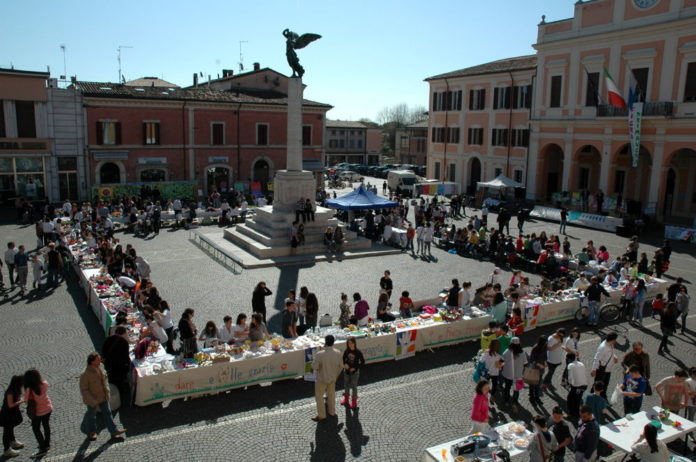
May 19, 2017 | Focolare Worldwide
 “We asked the mayor of Savignano sul Rubicone to send a message of fraternity by adding some color to a public space,” say Matteo and Giosuè, Italian members of Youth for a United World. “They gave us an underpass connecting the main road to the train station. We created a mural where we wrote, next to the bridge that symbolizes the city, ‘Let’s bridge’ and “Global citizens” in a number of languages, with the help of a number of migrant kids who came through.” The result was a collective work, a visible sign of peace. The mural project was also an opportunity to make contact with the head of the Ravenna mosque, Imam Mustapha Soufi (president of the European Islamic Conference of Imams). After three months of work the underpass was inaugurated with two mayors and a member of European Parliament who, just three days after the terrible events in Brussels (this was March 2016), had asked to participate in this type of project, one promoted by kids that instils hope in a peaceful future. The underpass became a symbolic place. Matteo and Giosuè are both “ambassadors of peace,” an honorary title bestowed on them by Universal Circle of Ambassadors of Peace, headquartered in Geneva, which has the goal of spotlighting all those who work for peace, especially young people and children ages 6 to 18. For a number of years, they have organized a spring fair in their region, together with other young people. This is a Young for Unity project that, in collaboration with schools, associations and local governments, hopes to create activities promoting peace and fraternity. “Last July,” continues Matteo, “together with 50 members of Young for Unity, we went to World Youth Day. Pope Francis concluded his words with ‘May God bless your dreams.’ There are so many dreams that we want to achieve, especially to be builders of a world of peace and fraternity.” After an earthquake struck central Italy, they felt called once again. Among the many ideas was one to put on two dinners in Modena and Cesena to raise funds. “We got close to 100 kids involved and served 350 people at table, raising more than 4,000 Euros.” The dinner at Cesena included Imam Mustapha, who asked them to come and meet young Muslims to start on a path for peace at the Ravenna mosque, one of the four official mosques in Italy. They were warmly welcomed on January 22. They took off their shoes as they entered, and the girls covered their heads. They sat in a circle, girls to one side, boys to the other. “We started playing a quiz game on the Bible and Quran – there are so many things in common. We are not so different, and all of us wanted to build a more united world. At noon we stood up and, holding hands, we had a minute of silence to ask God for the gift of peace.” After a meal of cous cous prepared by the Muslim mothers, the group had a guided tour of the mosque and a moment of dialogue. “Peace is made by the young,” says the imam, “we must unite and change our way of thinking in order to bring down the walls of prejudice.” Their Muslim friends asked to be able to visit a Catholic church next. “It feels fantastic,” concludes Giosuè. “To build peace we need to respect each other and not be afraid of differences. How can we not think of those Muslim kids that we meet at school or perhaps come across on the street? They too are our brothers, builders of peace together with us, and not terrorists like the media wants us to believe.”
“We asked the mayor of Savignano sul Rubicone to send a message of fraternity by adding some color to a public space,” say Matteo and Giosuè, Italian members of Youth for a United World. “They gave us an underpass connecting the main road to the train station. We created a mural where we wrote, next to the bridge that symbolizes the city, ‘Let’s bridge’ and “Global citizens” in a number of languages, with the help of a number of migrant kids who came through.” The result was a collective work, a visible sign of peace. The mural project was also an opportunity to make contact with the head of the Ravenna mosque, Imam Mustapha Soufi (president of the European Islamic Conference of Imams). After three months of work the underpass was inaugurated with two mayors and a member of European Parliament who, just three days after the terrible events in Brussels (this was March 2016), had asked to participate in this type of project, one promoted by kids that instils hope in a peaceful future. The underpass became a symbolic place. Matteo and Giosuè are both “ambassadors of peace,” an honorary title bestowed on them by Universal Circle of Ambassadors of Peace, headquartered in Geneva, which has the goal of spotlighting all those who work for peace, especially young people and children ages 6 to 18. For a number of years, they have organized a spring fair in their region, together with other young people. This is a Young for Unity project that, in collaboration with schools, associations and local governments, hopes to create activities promoting peace and fraternity. “Last July,” continues Matteo, “together with 50 members of Young for Unity, we went to World Youth Day. Pope Francis concluded his words with ‘May God bless your dreams.’ There are so many dreams that we want to achieve, especially to be builders of a world of peace and fraternity.” After an earthquake struck central Italy, they felt called once again. Among the many ideas was one to put on two dinners in Modena and Cesena to raise funds. “We got close to 100 kids involved and served 350 people at table, raising more than 4,000 Euros.” The dinner at Cesena included Imam Mustapha, who asked them to come and meet young Muslims to start on a path for peace at the Ravenna mosque, one of the four official mosques in Italy. They were warmly welcomed on January 22. They took off their shoes as they entered, and the girls covered their heads. They sat in a circle, girls to one side, boys to the other. “We started playing a quiz game on the Bible and Quran – there are so many things in common. We are not so different, and all of us wanted to build a more united world. At noon we stood up and, holding hands, we had a minute of silence to ask God for the gift of peace.” After a meal of cous cous prepared by the Muslim mothers, the group had a guided tour of the mosque and a moment of dialogue. “Peace is made by the young,” says the imam, “we must unite and change our way of thinking in order to bring down the walls of prejudice.” Their Muslim friends asked to be able to visit a Catholic church next. “It feels fantastic,” concludes Giosuè. “To build peace we need to respect each other and not be afraid of differences. How can we not think of those Muslim kids that we meet at school or perhaps come across on the street? They too are our brothers, builders of peace together with us, and not terrorists like the media wants us to believe.”
May 18, 2017 | Non categorizzato
https://vimeo.com/214590907
May 17, 2017 | Non categorizzato
Since 2005, World Telecommunication and Information Society Day, instituted by the United Nations Telecommunications Agency (UIT), is celebrated every year on 17 May. The goal is to enhance the contribution that such tools as the Internet and information technologies can give to society, to the economy, to the progress of humanity. Depending on the way they are put to use, these tools have the potential to enrich global society.
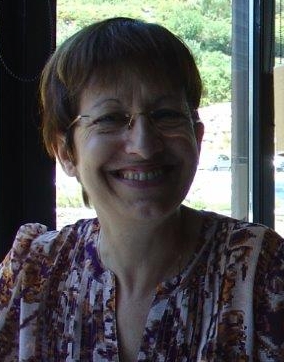
May 17, 2017 | Non categorizzato
 “There are questions in life that are truly difficult to answer: why does death, war, violence, separation or the gap between rich and poor exist? I would often talk with my university friends about these. I studied languages and literature at the University of Porto, in the north of Portugal – but no one seemed to be able to ease my concerns.
“There are questions in life that are truly difficult to answer: why does death, war, violence, separation or the gap between rich and poor exist? I would often talk with my university friends about these. I studied languages and literature at the University of Porto, in the north of Portugal – but no one seemed to be able to ease my concerns.
One day someone mentioned the Gospel and proposed I try living it. I couldn’t believe what I was hearing and objected. I know a lot of people who profess their Christianity, like I do. But after 2,000 years, things haven’t changed much. Yet given that finally someone was actually listening to me, I vented my doubts and judgements and went on for a bit. When it was time to say goodbye, the person only had space to say ‘Try it!’
In Porto I live in an apartment with other girls. That day I was the only who stayed home because I was studying for an exam. A poor lady knocked at the door. My first reaction was to get rid of her quickly, but I was held back by that ‘try it,’ which would pop up and challenge me every once in a while. We didn’t have much at home, but I found something to give the woman. “A bit later my mother called. She was in town for her medical checkup, and wanted to see if I was around: she had a bag of fruit and meat for us. My heart was full of joy, not just because that God-given food would feed us for a whole week, but because this confirmed that the Gospel is true. That small thing that I had just given to that woman had just come back to me hundredfold, just like the promise, ‘Give and you will be given.’
And so my new relationship with Jesus began, and got stronger every time that I tried to recognize him in each person I found myself next to. For my birthday I received a pair of fur gloves. I was hoping to get them for some time, since it gets icy at times here. Then I saw a woman shivering from the cold on the bus – what if I gave her my gloves? I did what I was thinking. This time I was jumping ahead a bit, since Jesus had already given me a hundredfold with that gift, so I could give my gloves to someone who needed them more than I did.
I was going to class when a lady carrying a baby stopped me. She was crying. I didn’t want to be late, I thought to myself, trying to get going. But inside I thought, ‘How can I say I love a God I don’t see and not love my neighbor that I do?’ (Jn 1:20). I looked at my watch and resisted the urge to leave. I stopped and got interested in her situation: she told me she had just left her child in the hospital doing quite poorly. She and her husband were living in two squalid rooms with their eight children.
I couldn’t do much right then and there, but I promised her I’d visit. That same day I told other young people and families from Focolare how I had gotten to know her. Each of them offered to help in whichever way they could. Together we provided the basic necessities (food, clothing, things for the house) and organized turns to help the children with their homework and play with them so their mother could be with their brother at the hospital.
At the same time we tried to understand how to let the city know about the situation and request better living space. A couple of weeks went by, and finally the much-awaited town truck arrived to move them to public housing. The privilege of taking the youngest child to their new home fell to me, and I will never forget that bus trip. The little one slept peacefully in my arms, unaware of the changes I’ve been seeing ever since I started living the Gospel.
Now those big questions, which are still there, have found some answers. I know now that taking the first step not only involves other people giving of themselves, but can even influence society.”



 Chiara Lubich
Chiara Lubich
